Winter can be pretty devastating if you’re not prepared. Your greatest companion when the blistering winter wind bellows is the heater.
For many people, the radiator heater is the preferred choice because of its mode of operation and how quickly it heats up the room and selected spaces.
Truth is, the snow can come down pretty heavily and cause you to freeze up in the mornings if you don’t take precautions. At this point, you’ll need your heater to run for long periods, but just how long can that be?
This post is here to answer the all-important question; “how long can you leave a radiator heater on”?
This is due to several concerns raised by users about the safety of radiator heaters when used for a long period or overnight, whether it heats up quickly and whether they can be run while sleeping.
Top 3 Radiator Heaters
How Long Does It Take for A Radiator Heater to Heat Up?
Simply put, some radiators heat up faster than others. Some can heat up a room in as little as 15 minutes, while others will require up to 25 minutes or more. For the sake of this post, we’ll say 15-30 minutes.
It all depends on the size of the room you’re heating and the wattage/capacity of the radiator. Some other times, you may find that your radiators do not heat at the same level due to lack of balance. This could be due to sludge or it may be that the radiator requires bleeding.
Nonetheless, under normal circumstances, a radiator should heat up a room within 15-30 minutes, depending on the factors explained above. But some experts say it’s a bit more complicated than that.
Other factors like ambient (outdoor) temperature, draft, and so on need to be considered as well.
Scientifically speaking, the time it takes for your room to heat up is mostly determined by the temperature of the room which is influenced by the heat energy in the room based on the ambient temperature and how well the room’s insulation is able to resist it.
So, basically, the heating speed in a room is determined by how much heat is gained versus how much heat is lost. If the room loses about 1,200 watts worth of heat and you have a 1,200-watt radiator, the heat in the room will remain at its original state.
However, if the room loses around 600 watts for instance and you have a 1,400-watt radiator heater, then you’ll be getting surplus heating of 800 watts or 80 joules per second.
But to clearly answer the question, a functional radiator heater would require between 15 and 30 minutes to heat up a room provided it is designed for the size of the room it’s been deployed.
But, What if the radiator itself heats up?
If you find that your radiator heater gets pretty hot, there may be a problem with the thermostat and you’ll need to get that fixed.
Turn down the thermostatic valve and get an expert to take a look. In some other cases, you may need to turn down the central heating on the boiler.
How Long Can You Leave a Radiator Heater On?
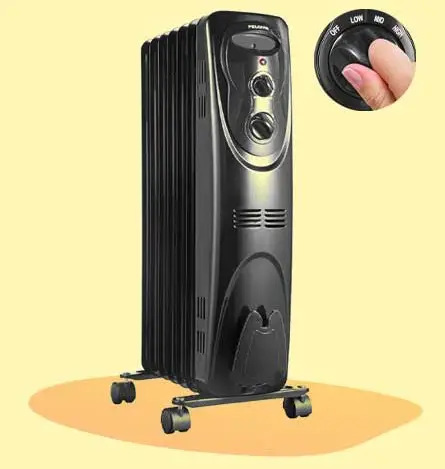
It is not possible to give a direct answer without considering certain factors. Truth is, you can leave your radiator on for a long period, often between 18 and 24 hours without the need to turn them off.
Some well-built, properly installed units can be run for upwards of 48 hours- even overnight- without any worries.
As long as you have it fixed to the wall, without any obstruction, with no curtains over them or beside them and no piece of cloth placed over the unit, you shouldn’t have a problem running the unit for long periods.
It is not possible to give a direct answer without considering certain factors. Truth is, you can leave your radiator on for a long period, often between 18 and 24 hours without the need to turn them off.
Some well-built, properly installed units can be run for upwards of 48 hours- even overnight- without any worries.
As long as you have it fixed to the wall, without any obstruction, with no curtains over them or beside them and no piece of cloth placed over the unit, you shouldn’t have a problem running the unit for long periods.
Leaving clothing on a radiator heater to dry can be pretty dangerous. Not only will this obstruct your thermostat and cause your unit to overheat, a piece of cloth can also make it easier for a fire to break out.
Radiator heaters have been built to be the perfect replacement for our central heaters, where the latter is not exactly required or cannot be afforded. Also, some people may turn off central heating to save up on energy bills, as radiator heaters are considered more cost-effective.
This is another consideration when deciding how long to run your unit- energy cost. An electric radiator will cost higher the longer it runs. You should run your radiator at full capacity for the first one hour and then take it down a notch or two after the room is heated up.
This will help to save up some cost. You may also want to shut it down after every 24 hours- for a maximum of 6 hours- to give it some rest time and keep energy costs down.
Can You Leave a Radiator Heater On Overnight?
Yes, you can. Your radiator heater can be left on overnight as long as it is not mounted on a flammable object or close to an item that may support overheating.
Also, try not to put it close to your curtains and be sure the unit and its thermostat are in perfect working condition. Truth is, radiator heaters, like most other space heaters, can overheat when in bad shape and cause a fire.
This is why we advise you only leave it on overnight if you’re sure it’s in perfect shape and placed far away from clothing, curtains and other items that may obscure it.
However, for the sake of your absolute safety and that of your family, we recommend that you always turn your radiator heater off at night, if you can do without it.
Can You Sleep with A Radiator Heater On?
Most people sleep at night, and if we’ve established that you can leave your radiator heater on all night, then you also can sleep while the unit runs, but should you?
If you have a fixed radiator, this may not be a problem as they are less risky, but those free-standing units can cause some serious damage like a fire outbreak. A child or pet may also accidentally knock them over at night and this can be dangerous.
Top 3 Best Radiator Heaters
1. PELONIS Electric Oil-filled Radiator Heater
Best Features
This Pelonis radiant heater is a stand-alone space heater with very functional and convenient features. The first point of attraction is the fitted 4 caster wheels on each side of the base for easy transport from one room to another.
Beyond that, it is quite portable with 3 heat settings at 600, 900 and 1,500 watts respectively, so you can customize your heater just as you want it or as the weather demands.
Safety is also of great importance here with the tip-over safety feature and overheats protection to keep you and your family safe while enhancing the unit’s lifespan.
Pros
- Easy to carry and move around.
- Safety features for enhanced protection.
- Also pretty quiet to run.
- 1-year warranty.
- Remote control for added convenience.
Cons
- Not a fixed wall heater.
2. De’Longhi DeLonghi Full Room Radiant Heater
Value for Money
Although not the cheapest radiator heater out there, it is worth every penny. De’Longhi put great thoughtfulness into the design of this product to give it not just an effective functionality, but also a great exterior look.
Packed with 1,000 watts of heating power and quiet operation, this unit is big enough for an entire room.
It also comes with 3 heat settings for multiple options and patented thermal slots for enhanced heat flow into your room, without heating up the unit. This great output is what has made it a truly valuable product.
Pros
- It is easy to use.
- Great temperature control.
- Energy-efficient radiator heater.
- Adequate safety features for safe use.
- Great heat output.
Cons
- Not the cheapest on the market.
- May not support overnight use.
3. Amazon Basics Portable Digital Radiator Heater
Best for Price
Portable, compact and lightweight are the simplest ways to describe this unit. But the most outstanding feature for us is its wavy fin which helps to direct heat flow to every part of the room.
It is a 1,500-watt portable radiator heater suitable for small to medium-sized spaces. The unit also comes with 3 heat settings and its thermostat is adjustable so you can choose your ideal temperature.
And just so you know, this product is ETL-listed for safety and has most of the features that’ll make any heater safe to use. If you’re looking for a cost-effective and portable unit for space heating, this is probably what you need.
Pros
- Quite affordable
- Easy to use and maneuver.
- Portable and compact.
- Extremely lightweight.
- Remote operation for convenience.
Cons
- Not suitable for large rooms.
- It May overheat if used for too long periods.
Final Words:
Your radiator heater should be your go-to appliance when it’s cold indoors and you only need to heat up a room or space. But getting the right product that can last longer and offer you the amount of heating you desire is the first step.
You should know that how long you run your heater is dependent on the type of heater you have and how well positioned it is. The products recommended here are based on certain parameters and should provide sufficient heating and safety.
| Photo | Title | Buy |
|---|---|---|

|
LEVOIT Air Purifier for Home & Bedroom - For Allergies and Pets Hair | Check Price On Amazon |

|
BREEZOME 60 OZ Quiet Dehumidifiers for Home, Dual-Semiconductor | Check Price On Amazon |

|
AquaOasis™ Cool Mist Quiet Ultrasonic Humidifier for Bedroom & Large room | Check Price On Amazon |

|
43.3'' Portable Air Conditioners, 3-IN-1 Evaporative Air Cooler w/Remote | Check Price On Amazon |

|
BlueDri BD-AS-550-BL Negative Machine Airbourne Cleaner HEPA Air Scrubber | Check Price On Amazon |

|
Space Heater, VCK 24" 12ft/s Fast Quiet Heating Portable Electric Heater | Check Price On Amazon |
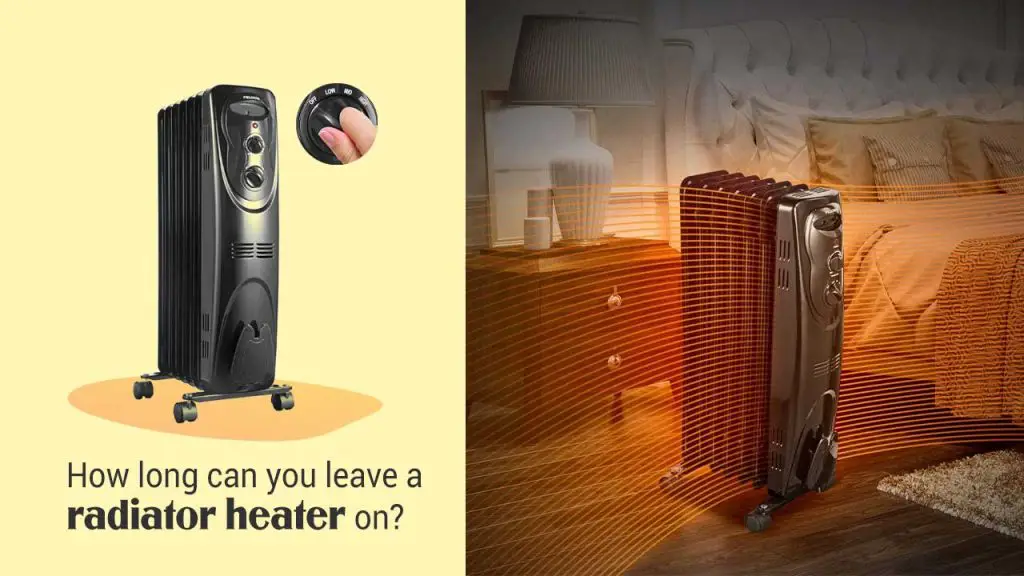
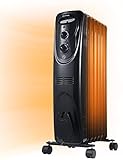

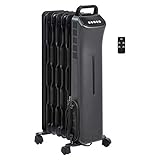


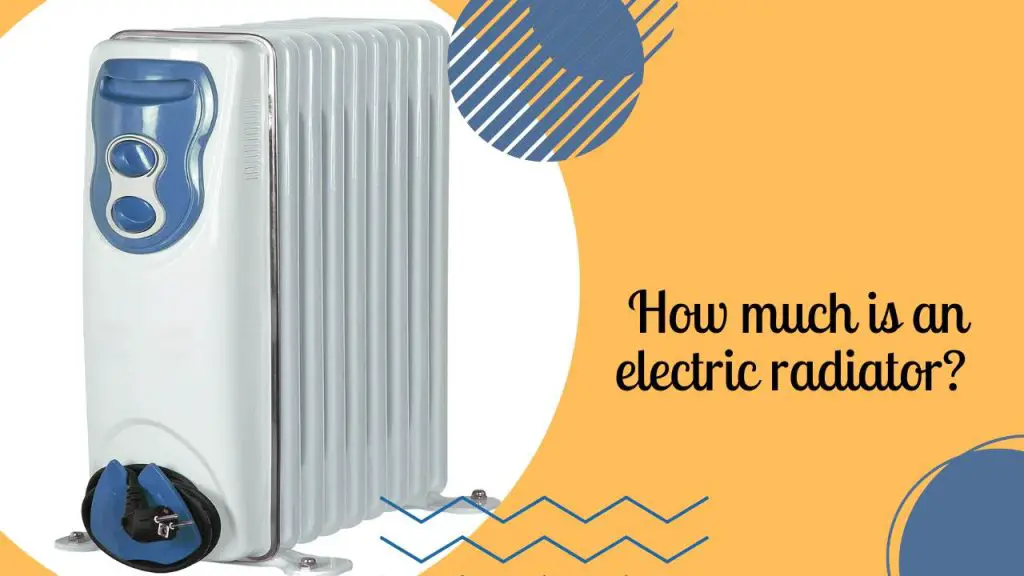


![Ventless Heater Moisture Problems [Possible Reasons & Solution]](https://www.airpurelife.com/wp-content/uploads/2022/12/Why-do-ventless-heaters-create-moisture-1024x576.jpg)